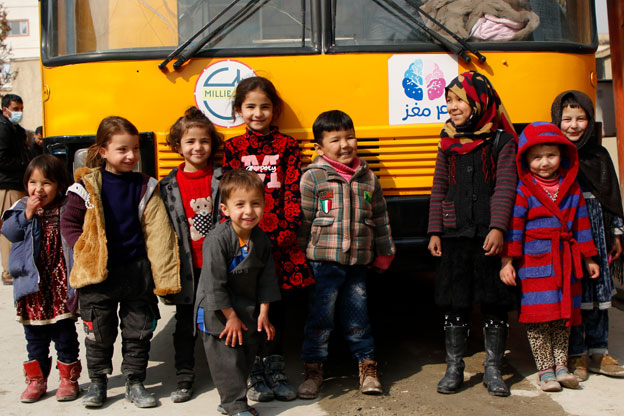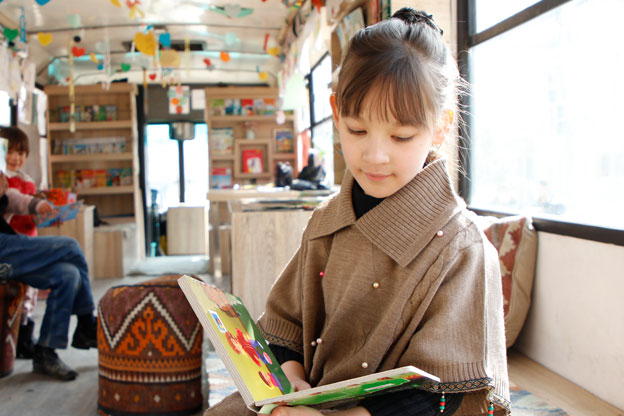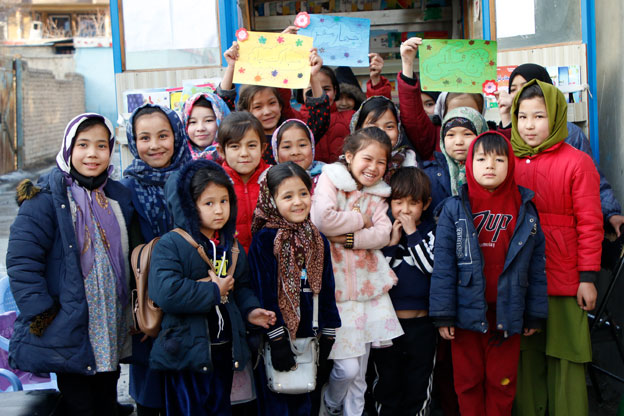In this episode of Human Rights Chat, New Tactics interviews Freshta Karim, the founder and executive director of the Charmaghz mobile library in Afghanistan. Charmaghz provides space for children to play, learn, and envision a new future for their country. Scroll down to listen to the podcast and read the interview!
You can find the Human Rights Chat podcast on Spotify, Apple Podcasts, Google Podcasts or Soundcloud. Read more on this human rights-based tactic here.
Afghanistan continues to face a critical educational crisis. Only 7% of children are able to read by the age of 10 and nearly 4 million primary age children - many of which are girls - are out of school altogether.The mission of the Charmaghz mobile library is to create space for critical thinking and Children’s Imagination in areas that have been heavily affected by conflict. Charmaghz has 16 mobile libraries, including buses, vans and library boxes that are located inside public primary schools in Kabul. It’s now the largest children’s library network in the country, serving more than 2,000 children per day.
Charmaghz also employs more than 50 individuals in Afghanistan, 80% of which are women. It is one of the few Afghan nonprofits that has managed to sustain its work despite the restrictions from the de facto Taliban authorities.
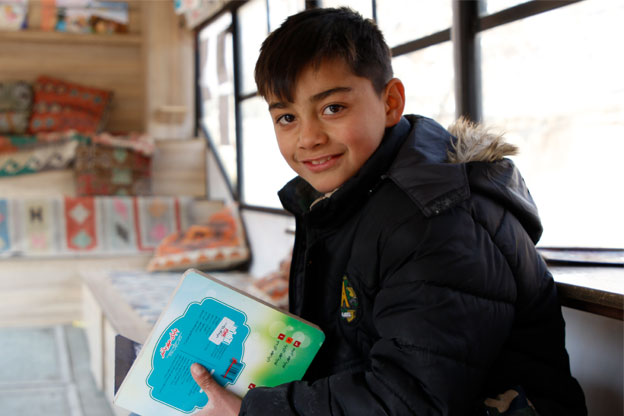
This tactic is restorative in nature - aimed at healing the wounds that decades of conflict have had on Afghanistan’s youth. Charmaghz shows that even within challenging circumstances, innovative community solutions can provide healing and access to human rights.
Transcript of Interview with Freshta Karim
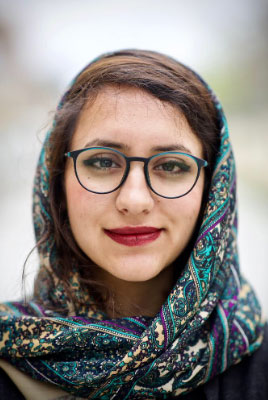 So my name is Freshta Karim, and the project I’m leading in Afghanistan is called Charmaghz, which means “Walnut.” It’s a Persian name, and we named it “Walnut,” because our main area of focus is critical thinking, so we thought we should name it something relevant and something exciting for children. And we have 16 mobile libraries working in Afghanistan, hosting 2,000 children per day. We are the largest chain of libraries in the country for children.
So my name is Freshta Karim, and the project I’m leading in Afghanistan is called Charmaghz, which means “Walnut.” It’s a Persian name, and we named it “Walnut,” because our main area of focus is critical thinking, so we thought we should name it something relevant and something exciting for children. And we have 16 mobile libraries working in Afghanistan, hosting 2,000 children per day. We are the largest chain of libraries in the country for children.
That's incredible. I didn't realize that you had so many. You've had a lot of growth in the last few years. That's amazing! So I kind of wanted to take a step back and hear a little bit about your personal story. I think we all have a unique story about what brought us into humanitarian or human rights work, and so I'd love to hear a little bit just about your background and what led you to becoming a children's rights advocate.
I think it's a collective of things. It’s really hard to findwhat exactly brought this, but I think it's it's so many things coming together to make us do what we are doing right now. For me, it has been my journey of working with children and for children from a very young age. When I was 12 years old, I started working in a TV channel. I was hosting children’s TV shows, and I worked there all the way until I was 17, so I grew up in a TV channel. In this couple of years that I worked in a TV channel, I was part of different programs, but one of the programs that majorly impacted my awareness, and probably my political education, was a program where I was interviewing children about their challenges. And then I was going and interviewing the government officials, trying to be a bridge between children and government officials, building awareness around their situation and advocating for that situation to change. So I think that’s where I built a huge consciousness and awareness of what children are going through and why it is important work and why children themselves have a voice, and why that voice needs to find a place. And since then I’ve been working for children in different platforms, but the major investment in children, particularly in working in the education sector, has been in the last five years where we are working through this NGO.
So you’ve been in existence for five years. Can you tell me how the Charmaghz mobile library started? Obviously it has grown a lot. What have been some of the challenges along the way?
In 2018, on the 14th of February, Valentine’s Day, on a lovely snowy day in Kabul, we launched our first mobile library with the vision that we need to take responsibility for ourselves and try to design a future or try to make a story together with children: a different story for our country. That was the bigger vision for it. Since then, we have been working starting from one mobile library where we collected books from our friends to turn an old public bus into a mobile library, and since then it has grown. Right now we have five bus libraries, one van library, and ten library boxes that go inside the schools and work with children there. In terms of challenges, I think working in a conflict zone, it has been absolutely challenging. We are not able to expand as much as we want. But yeah, I have been realizing that working in a conflict zone is absolutely very difficult work to do.
I can imagine. How many staff do you have?
We are a team of 56 people. Three of us are out of the country, and the rest are inside Afghanistan. 80% of our colleagues are women, and I am very proud to say that it is a women majority organization.
I’d love to hear from the perspective of a child that comes to visit the mobile library bus – What do they see? What do they do? What have been some of your favorite things to witness or experience?
So the way we have designed the libraries, they’re really really bright colors. The children love it. And the buses are so huge, so when it comes to streets and communities, it immediately grabs childrens’ attention. At the beginning, they were very surprised at what it is, and they had all these questions. But now they’re so used to it. It’s so much part of their lives that they keep waiting for when the bus is visiting them. If we come late, they make complaints of “why are we late,” “you should be on time,” “we want to spend more time.” All the way until we leave the area and they wave their hands. They keep track of what we do and what we don’t do. They give us a lot of consultation on how they want the bus to be designed. For example, one of the major things we have been hearing from children is, “We are ready to learn Mathematics, literacy or whatever you say, but it has to be through play. We want to play. Otherwise, it’s boring.” And we have considered that so much as part of our work, that anything we do has to have play as a big part of it.
The parents are also a big part of it. Whenever we go to communities, parents make sure to bring us tea and dried fruits and just make sure we are well-fed so we can work well with children. It’s quite a community oriented program, with children and parents feeling that it’s their program. And that’s the part I love the most about it.
That warms my heart to hear and imagine – that it’s their space. That as kids who are living in a conflict-affected area and may not feel like they have much of a voice, they get to have some control over making a space that feels comfortable and safe and fun for them to learn.
That’s how we have designed it, because we do understand the issue of agency – that children often in societies that are conflict-oriented and in many ways conservative, children are not seen as equal partners. Rather, they are seen as an “empty cup,” and we are filling them. That’s generally the approach towards children, and that’s what we are trying to change in our work. They’re our equal partners and we respect them. They are part of the decision-making process. They are part of the design process. Their voice matters. And we have taken this into really small details. For example, a child who comes into the library, he writes his name; he writes his surname; he writes his signature. And this is to tell him that “You are an individual. You’re not a number for us.” Most of our colleagues know the names of the 2,000 children who visit the library every day, as well as what they like and what they don’t like. So, it’s a lot of working around the fact that children feel respected and a sense of dignity, a sense of agency.
That’s a beautiful perspective. They’re never too young to participate and make a change. It’s very inspiring. For me, the experience of having access to books and safe space seems very powerful. Can you speak to the power of that experience and the kinds of exchange that happen within the space?
I think having a safe space to come and to have access to books beyond your school textbooks – many children in Afghanistan only have access to their school textbooks, not to storybooks, not to magazines. So they come here, where they have liberty to choose what they want to read, what stories they want to read, how they want to read, if they want to read in groups, with their friends, if they want to play first, for example, play chess or some of the mental health games that we have, or do they want to have painting… So there are a lot of choices. And children learn to make these choices. And based on their choice decide what they want to do. Which shows that a child starts learning how to make these decisions and imagining when they start reading these storybooks, they are able to start imagining and broaden their worldview, to see what is beyond. For example, if they’re reading a storybook, to put themselves in the state of those characters, to try to understand all of these complex emotions. Which we think helps them a lot in their creativity, understanding, empathy, compassion – all those really important things. And probably at times, I also think there is escape. Personally for me, libraries have always been an escape from the world around us, and the truth of a world in conflict is that it’s a very stressful world. And even if conflict is not right near your door, the fact that there is conflict in other parts, that there is political tension – this creates a huge stress. You need a place to go where you feel safe, where you think “the books are my friend. I can read, and I’m not going to be judged” – a place where you can concentrate on one thing.
I can tell you’re exuding passion about this. So, you do have permission to operate as a primary education initiative. You have support from local authorities. I think I read somewhere that there was collaboration with the Ministry of Education to expand services in schools. Are those plans still underway? Are there additional plans for expansion and collaboration with schools in Kabul?
Yes. So since we launched, we have been working with schools, and we’re trying to expand to as many schools as we can. We understand that as the political crisis is deepening, we realize a sense of responsibility as the demand is increasing. The opportunities for children to feel safe, to experience learning opportunities beyond their school have deteriorated so much. That’s why our work is becoming even more important, and we are committed to continue for as long as we can.
From the perspective of an outsider, I just have a desire of“What can I do?”Do you have any suggestions for what your average globally and civically minded citizen can do to support women and girls who are living in crisis in Afghanistan, and if you want to be more specific, what can people do to support the Charmaghz mobile library?
So I think on the bigger issue of what people can do – I feel as citizens of this world, we all are responsible to ensure that the foreign policy of each country is just. I think we are in the 21st century, and we all know that we all are human. I could have been born in the UK or America, and you could have been born in Afghanistan. By chance, we are where we are. And I feel we are responsible to make sure that our governments and their foreign policies are not unjust toward other people. And I think that’s what I expect from people – to be part of politics in their countries, to be active participants in it. Let’s connect “national interests” to “human interests” – human interests of everyone , not just people who are within the geography of my country, but people everywhere. That’s what I feel – that there needs to be a revolution in the international politics and foreign policy of countries. That is for world citizens I think.
And with regards to what they can do for Charmaghz, I think we need huge financial support to continue our work. We are open to receive donations from people to expand and ensure that we are able to hire more staff and reach more children. And together with children – create a new story. I believe the situation is so dark, but I am still hopeful, because I feel there is no other alternative. We need to be hopeful that we have certain agency, even if it is really small, that we can bring those changes. And if each one of us have a small sense of agency, then we can bring it together, we can mobilize each other and try to change.
You always have to maintain hope. The beautiful thing is you have a lot of support globally. Hopefully the international community takes action so the situation can improve.
I think one of the problems with living under conditions of political uncertainty is that over time you start doing self-censorship, and then you stop dreaming. And I think that is the worst part. Because if you don’t have dreams – how are you going to change the situation? And I hope we all could continue dreaming. Because at the end of the day, I also realize that as much as we have all these problems, we also have each other. Just looking around ourselves, there is so much good in humanity, and there has been this good in humanity for a long time. The world has seen World War I, World War II – so many wars. But in all these wars, we have been able to come out of it better because we have had each other, people who could even see humanity in their oppressor. And I think that constantly inspires me, that there is still hope.
There is a conversation we have a lot with activists at New Tactics, and you mentioned taking care of your staff. How do you protect your own mental health – your own wellness and resilience? Do you have any specific advice that you give your staff or things that are your go-to coping strategies?
Yes, I think we have been becoming more conscious of the fact that if we want to work sustainably, we have a long struggle ahead of us. To be able to sustain in that, we need a lot of self care, and that should be at the core of our work – each of us individually and then taking care of each other as a team. For us, it has been showing a huge solidarity to each other, listening to each other. Just talking. Just knowing that we are here to listen to each other.
And knowing that we can be extremely sad, but we can still allow ourselves to have moments of joy. To joke, to find a little humor in life. I think that combination of celebrating little things in our lives – those little things have been really hopeful for us: to be able to laugh, to be able to cry together and allow that space to cry. That has been very helpful for us. But I think we are still learning what self-care means for people working in human rights. There is still so much for us to learn – that it’s not always about giving – it’s also about receiving. It’s also about creating our boundaries. It’s also about adding joy in our struggle. It’s about play, adding play into it. These are all important bits and pieces from our side.
I love that you model that mindset for the children as well. I think a common struggle across the human rights and humanitarian field is how to not burn out when you’re dealing with such heavy issues all the time. And I think the answer for a lot of people is just there’s no other choice. You have to keep up the good fight for the long haul, and in order to do that, we have to prioritize our own wellness. The only other option is not continuing forward and not reenvisioning that new world forward.
Exactly. I do give credit to people working in human rights. It’s absolutely so difficult. I sometimes feel like my entire heart – I feel this huge pain in my heart looking at human misery. It sometimes looks so impossible to witness. To witness human misery to this level and still remain alive. We are strange creatures. We have a huge capacity to still remain alive after experiencing so much pain in our lives – some of it beyond our imagination, something one had never imagined a human is capable, a system, a government or authorities would be capable of doing something like this to humanity. And you live with it – day one, day two, day three, and this pain becomes part of you. And you carry your pain within you. And I think that’s the most difficult part of working in this area because you don’t just carry the pain, but you also have to work. So how do you carry the pain and work in a way where your pain doesn’t turn into hatred, but you continue working out of love for humanity? I find it a big challenge.
That was beautifully stated – you’re very poetic with your words. It’s amazing how resilient we are as human beings. And that’s the work that we do at CVT – helping survivors of horrible atrocities, survivors of torture, survivors of human rights violation – helping those communities heal. And there’s always joy and hope in our collective community and the way that we’re able to care for one another.
Is there anything else you would like to share that we didn’t cover in the conversation today?
It looks like what we’re doing and the conditions we’re working in, sometimes it looks like it’s a story I’m reading, a novel I’m reading – with the challenges that are coming, with the resilience my colleagues are showing, with the passion they’re working with, with the reaction of people, with the support of parents. I look at it, and I feel a lot of hope. I feel like if we have a group of people in the middle of a situation where it’s hard to keep hope, but people wake up with energy and think “Today, what can I do for children?” And probably that’s what a lot of people working under very difficult circumstances do – you wake up and you think “What can I do for humanity today?” And I think as long as we have that question – “What can I do today? How can I fight injustice today?” – I remain hopeful. And I think that, to me, is really important.
And another strength that our colleagues have shown is that we are providing services to children – to children of everyone. And you’re still trying to understand and find humanity in all sides of the conflict and hope for a future where all people could sit together for justice to take place. This shows a lot of resilience to me, and I’m very grateful to have had the opportunity to work with people in this situation and in this time. It feels to me that it has made me a better person. I can feel my heart, and I am not numb. And I’m so grateful that I’m not numb.
Congratulations on everything you’ve accomplished. It’s truly incredibly impressive. When I saw the story, I was like “How? How are they able to operate and so successfully?” It’s such a beautiful, joyful story to see from a place where a lot of the stories are not that. I really appreciate you being so open in telling us about your work.
Do you want to tell us your website and where people can find you online?
Yes, our website is www.Charmaghz.org, and we are having an online fundraising campaign and global campaign right now. We are very active on Instagram – that’s our main place.
What we can learn from Charmaghz
This story shows us that joy and resilience can be found even amidst challenging circumstances. New Tactics has examined similar tactics to this in countries around the world - all spreading the joy of reading to children who otherwise would not have access to books.
In the Philippines for example, children from indigenous fishing communities are learning to read and write thanks to floating boat schools. In Colombia, makeshift donkey libraries called Biblioburro take books to children in rural communities who otherwise wouldn’t have access to reading materials.
For more ideas and inspiration on how you can achieve your human rights goals, go to newtactics.org/tactics to browse our more than 250 examples of successful human rights tactics.


